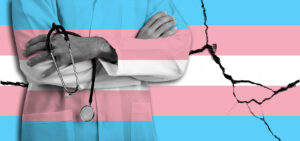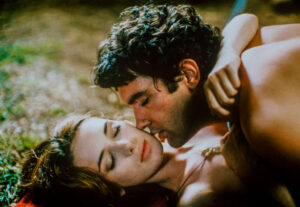Let me take you back to 1996, and an important year for life-changing discoveries. In Scotland, scientists at the Roslin Institute were cloning Dolly the Sheep. In the US, human DNA sequencing was just getting going. Meanwhile, all over the world, like adventurous female explorers setting foot in an unknown land, women were intrepidly discovering their vaginas. Or at least so asserts the potent mythology surrounding Eve Ensler’s play The Vagina Monologues, arriving on stage to rapturous applause that very year.
Certainly, during the late Nineties and early 2000s, it seemed you couldn’t move for performances of this piece. Celebrities would vie with each other to appear in benefit productions, revelling in the dramatic opportunities afforded by such monologues as “My Angry Vagina”, “The Woman Who Loved To Make Vaginas Happy” and “My Vagina was My Village”. Since then, there have been Mormon versions, Muslim versions, and Ethiopian disabled versions. In 2006, The New York Times called the work “probably the most important piece of political theater of the last decade”.
On some university campuses, the play is still performed every year. If you believe the hype — and clearly, thousands of women do — Ensler is personally responsible for bringing genital liberation to millions. Interviewed in 2018, she claimed that, as a result of her work, “many more women have seen their vaginas and know them and know what gives them pleasure and know they have agency and rights over them”.
Fast forward to the present day, and Ensler — now nearly 70, and known simply by the letter “V”, which she describes as her “freedom name” — has a new book out. It’s called The Reckoning, and is a collection of extracts from “journals and diaries”, “stacks of espresso-stained writings” and “monologues, plays, articles, essays, fables, speeches, rants, and poems”. The selected pieces date from the late Eighties to the recent past. Quite a lot of the work was originally commissioned by The Guardian. It includes some disturbing recollections of V’s own traumatic childhood; many descriptions of sadistic violence against women and girls; performance pieces about friends who died of AIDS; accusing tracts launched at her mother, global capitalism, and Donald Trump; impassioned fulminations against Republican abortion bans; and a truly awful poem about sex.
To what extent the book’s title is merited is unclear. There is a valiant attempt in the Introduction to manufacture a coherent narrative out of what will follow, suggesting that the work somehow traces the prehistory of various recent political crises, including the Government’s handling of Covid, George Floyd’s death, and the Californian bushfires. V’s stated aim, implicit in the book’s title, is the pursuit of “deep accountability” for “the cruelty at the heart of the US Empire” and “the shattered veins of racist patriarchal capitalism… bleeding everywhere”.
In truth, though, there is no real reckoning here — for that would require an argument. Instead, the reader is taken on a rambling and somewhat ghoulish tour through various moments in the author’s life to date, delivered in some of the most shockingly bad prose I have ever encountered on the page. (See, for instance, her description of lockdown: “Wherever you were when the music stopped, whomever you were with, became the pod or the petri dish of your scrutinous metamorphosis”.)
But still, I am glad I read it. Effectively, The Reckoning functions a bit like a chapter from William Hazlitt’s The Spirit of The Age, allowing me to better understand the present moment in mainstream feminism through the personage of V/Ensler — a character always at the heart of everything she writes, even when ostensibly describing other people. To read this book in my fifties is to re-immerse myself in a worldview once so familiar to me that, as a relatively unquestioning young woman, I could barely differentiate it from the air I breathed. In particular, through its inadvertent depiction of V’s grandiosity, sentimentality, intellectual carelessness, and general hyperemotionality, the book allowed me to better discern a once wildly popular cultural archetype — the American liberal feminist of the Nineties and Noughties — and to newly despair at the wreckage left in her wake.
There are lots of clues in the book as to how the modern day character of the progressive Western feminist has evolved via a process of adaptation from her slightly earlier foremother. There’s the tone — so dramatic, so humourless, so exhausted. There’s a lot of narcissism, rippling unconfined throughout V’s book under the usual pretext of making the personal political. There are some magical beliefs, and a general lack of concern for rationality. “Femicide” is nonsensically defined as “violence against women and girls (cisgender, transgender, and those who hold fluid identities that are subject to gender-based violence)”. Cancer is described as caused by “memories of trauma… where the meanness left its mark”.
Ironically for a book supposedly aimed at bringing down the capitalist order, there are also various familiar neoliberal fantasies. Female sexual pleasure is inevitably cast as liberation, and female bodies are both extremely important (when you want them to be) and negligible (when you don’t). Proposed strategies for rectifying women’s problems all seem selected for their potential visual currency in films produced by Susan Sarandon: “Bare-breasted bodies in the streets pushing back against femicide. Indigenous women’s bodies on horseback, in kayaks on the river standing off pipelines about to spill oil. Fist-raised bodies pressed right up against rows of erupting police. Hundreds of differently abled bodies occupying the corridors of Congress.”
Equally — and as was also present in The Vagina Monologues’ tales of repressed old ladies first discovering their clitorises — there is an infantilised image of women generally. In V’s eyes, they only seem to have three possible modes: crushed by unbearable mistreatment, rising phoenix-like with powerful rage, or dancing with child-like joy. Emotions dominate our thinking, apparently; and such is the awful weight of patriarchy upon us, we can’t work out much for ourselves without being enlightened by seers like her.
We also find in the book a telling disregard for the value of privacy — a foreshadowing of all those OnlyFans accounts, and the casual opening up of woman-only spaces to all-comers. Dressed up as a noble quest to get rid of irrational shame, in fact V seems to have no personal boundaries and nor does she respect those of others. An early section entitled “Walls” is prefaced by the telling admission: “I have always been obsessed with walls — who needs to build them, who’s devoted to tearing them down… For much of my life I have tried to find ways to get inside.”
Her own traumatic childhood experiences, including horrendous details about abuse at the hands of her parents, are extensively mined for content. But it’s the relentlessly graphic depiction of other people’s suffering that is most striking. A poem about a friend called Richard, dying of AIDS, seems to revel in humiliating aspects of his decline. (“He checked his penis underneath the diapers to see if he was peeing, to see if there was pee.”) As I read, I found myself praying that, should I have the misfortune to fall seriously ill like this, no friend with literary pretensions will ever try to immortalise my experience.
V also volunteers in domestic violence shelters, imaginatively conjuring the lives of the women she meets there (“Sometimes I’m a slab of cow meat on two hard orange plastic chairs… Sometimes the flies rest on me and I don’t shoo them away. They fuck on me and lay eggs”). And when she can’t find enough suffering at home, she travels abroad to find it. From her stories of raped women of the Democratic Republic of Congo — “women whose insides were blown apart by rifle blasts and whose bodies now leak uncontrollable streams of urine and feces” — to her images of “lit cigarettes almost put through the soldier’s wife’s eyeballs” in Bosnia, there is prurience here — and a sense that, beneath all the apparently heartfelt expressions of horror, a story is satisfyingly confirmed by the world, to which the author is professionally rather attached.
There are obviously better ways than this to write about violence against women and girls. Nearly all of them involve dispassionate rational analysis, bringing in theory as well as local social context where required, to try to understand what is happening and prevent it in future. But as far as I can see, contemporary media-friendly feminism doesn’t seem to be able to provide much of this. Instead — as in the writing that composes The Reckoning — we often get an orgy of emoting, a competitive fetishisation of female suffering, all offered in the secret service of making the horrified, empathy-filled onlooker the real star.
Back in the mid-Nineties, when The Vagina Monologues was gaining notoriety, another literary genre was also gathering steam: “misery lit”, with book titles such as A Child Called It and Please, Daddy, No. Graphic descriptions of child abuse would be lingered over by authors for chapter after chapter, much to the apparent fascination of tens of thousands of readers. Progressive broadsheets liked to look down on this genre as low-rent, with both The New York Times and The Guardian publishing disapproving analyses of the trend at the time. When writing misery lit, they said, you are monetising human misery in a way that problematically appeals to dark and debased feelings. But if you call it feminism, apparently you are off the hook.
Occasionally, V shows some self-awareness about this — most notably, in a chapter about Bosnian refugees in which she admits: “I was hearing their stories as potential dramas, measuring their words in terms of beats and momentum. This approach made me feel cold, impervious, superior.” But most of the time she seems to position herself, entirely misleadingly, as a brave, unflinching conduit through which readers can confront appalling truths about humanity. As such, she seems to be a forerunner of much self-indulgent feminist writing still to come.
As I write this, videos and images of raped and brutalised Israeli women are circulating on the internet. No doubt writers and journalists are already rushing to get on planes, in in the hope of turning these women’s suffering into further horrible spectacle for the pleasure of emotionally masochistic readers. V is quite right that we need a feminist reckoning. But perhaps it’s not exactly the one she means.
Disclaimer
Some of the posts we share are controversial and we do not necessarily agree with them in the whole extend. Sometimes we agree with the content or part of it but we do not agree with the narration or language. Nevertheless we find them somehow interesting, valuable and/or informative or we share them, because we strongly believe in freedom of speech, free press and journalism. We strongly encourage you to have a critical approach to all the content, do your own research and analysis to build your own opinion.
We would be glad to have your feedback.
Source: UnHerd Read the original article here: https://unherd.com/





